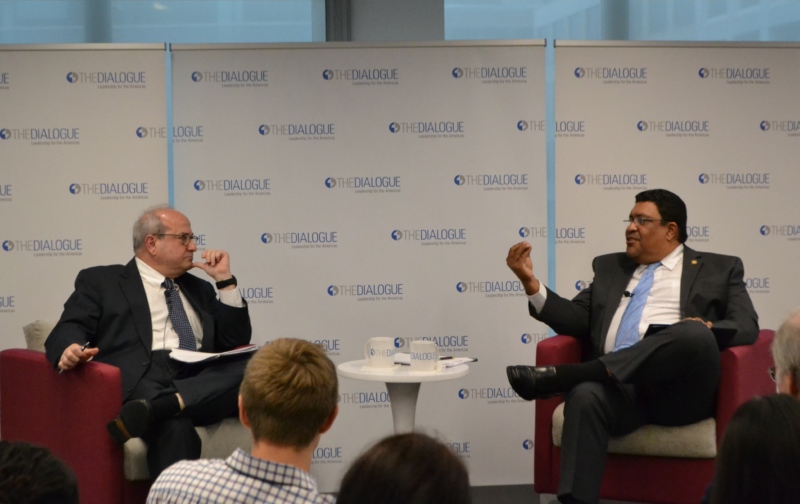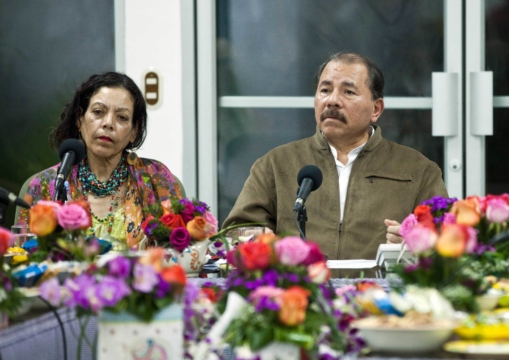A Fatal Blow to Democracy
Nicaragua is on the precipice.
On September 24, the Inter-American Dialogue hosted a conversation between Valdrack Jaentschke, Nicaragua’s Vice Minister of Foreign Affairs, and Dialogue President Michael Shifter. The conversation began with introductory observations on some of the most poignant issues currently going on in Nicaragua, where according to the OAS and the UN, protests against the Ortega regime have been met with repression from the government. The catalog of abuses and violations, according to the Inter-American Human Rights Commission, include 320 people killed, attacks and intimidation towards the protesters, and some cases of torture, where the main victims have been human rights defenders, university students, and journalists. Shifter said that the Dialogue believes in the value and importance of having opportunities to hold face to face conversations with senior officials representing different regimes. The main goal of these events is the establishment of lines of communication to pave the way towards a peaceful and democratic way forward.
"The fundamental response of the government has been to avoid civil war ... One death is one death too many," says Jaentschke at #NicaraguaDialogue, in reference to the country's "violent protests."
— The Inter-American Dialogue (@The_Dialogue) September 24, 2018
Happening now: https://t.co/aQFppumQ9Q pic.twitter.com/XC4SEt9EgP
Vice Minister Jaentschke said that the development model in place since 2007, when President Ortega came to power, was targeted by a violent coup. According to the Vice Minister, the violent protests derailed the efforts of the Nicaraguan people and its government to achieve democracy, economic growth, and social wellbeing. The overarching theme of his remarks attempted to shed light on the reasons why Ortega’s government calls the protests "a coup with criminal intents". The Vice Minister mentioned the history of struggle for independence and sovereignty that Nicaragua suffered under the pressure of external “far right and neoliberal agenda backing forces”. He considered that the Sandinista effort seeks to unify and dignify the national development agenda, keeping in mind that democracy in Nicaragua started with a revolution that sought to get rid of foreign intervention. He also said that the concept of “recapturing the state” is a fundamental development goal of Ortega´s government. The main purpose is to build a strong nation-state based on economic coordination, international cooperation, and security, which he considers “one of the most important elements in the Nicaragua project of stability in the region”.
Turning to the topic of security, the Vice Minister attempted to discredit the allegations of violence and brutality for which the Nicaraguan government has been accused during the past weeks. He claimed that the right-wing forces have instilled a mechanism of terror based in:
Shifter followed up with the observation that Ortega´s regime is not the model of governance that it used to be when he came into power in 2007. Vice Minister Jaentschke attributed this change to the homogenous opinions portrayed by the media and oppression of Sandinista supporters that are fighting to defend the constitutionality of the government. When asked about the next steps to control the situation, the Vice Minister said that the government will not negotiate with the people, given that President Ortega was democratically elected with more than 60% of the votes; therefore, holding such conversations would be undemocratic.
All things considered, it is evident that the audience did not agree with the Vice Minister´s position, given the controversial nature of Nicaragua´s humanitarian crisis. The session concluded with a Q&A, which shed light on the audience’s discrepancies with what he said in his remarks. By emphasizing Ortega regime’s violations and abuse, the participants reaffirmed that the Vice Minister’s speech was “mere government propaganda” insulting the intelligence and dignity of the Nicaraguan people. Shifter concluded with the statement that by involving both political and civil society actors, Latin America will be able to attain a democratic and peaceful transition for the people of Nicaragua.
Nicaragua is on the precipice.
What will Ortega’s landslide victory allow him to do in his next term?
Strongman Daniel Ortega is running for a third term (with his wife as VP) and cravenly removing all checks on his power. Sound familiar?
 Irene Estefania Gonzalez / Inter-American Dialogue
Irene Estefania Gonzalez / Inter-American Dialogue
